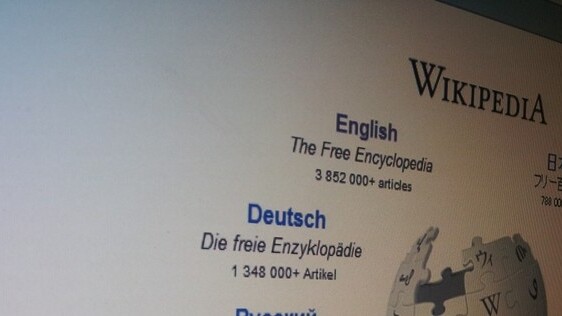
At the DLD Conference in Munich last month, Pavel Durov – creator of Russian social network Vkontakte — pledged his support to Wikipedia live on stage, announcing he would donate a cool $1 million dollars to the online encyclopaedia, representing one of the largest contributions the website has received since it launched back in 2001.
During an interview with The Next Web last November, Wikipedia founder Jimmy Wales discussed its donations process, noting that Google holds the overall record for the site’s single biggest contribution, $2 million, with a number of other investors making $500,000 pledges. Overall, it raised $20m in 2011 from more than one million individual donors, and is seeking to top that figure in 2012 by securing nearly $30m.
Wales also revealed that the encyclopedia has 420m unique monthly visitors, and there are now over 20 million articles on Wikipedia across almost 300 languages. Regardless of your personal feelings on Wikipedia as a fact-verifying platform, there’s little doubt that it is one of the Internet’s biggest success stories. And the fact that it flourishes on donations alone is, in itself, a remarkable achievement.
Wiki-stats
Some interesting stats have emerged off the back of a readers’ survey Wikipedia carried out last year – for example, roughly a quarter of its respondents said they would donate, with readers from the US, Egypt and India most likely to do so. Wikipedia has been drip-feeding various tidbits from the study for a few months now, such as the average Wikipedia users is 36-years-old, half of its readers actively search for Wikipedia content rather than stumbling upon it via a search engine, and only 6% of its users have ever edited a Wikipedia page.
Now, Wikipedia has revealed that only around half of its readers realize that Wikipedia is a non-profit. Wikimedia Foundation’s Mani Pande, Head of Global Development Research, and Ayush Khanna, Data Analyst, Global Development, say:
“A lot of our readers are simply unaware of the fact that Wikipedia is a non-profit entity run entirely on donations from the general public. On average, 47% of our readers did not know this. Awareness was especially low in Russia (36%), Brazil (44%) and the United States (44%).”
According to Wikipedia’s survey, 61% of its India-based participants were aware of Wikipedia’s non-profit status, whilst Egypt scored highest with 70%. Readers with a graduate-level education were far more likely to be aware of Wikipedia’s not-for-profit status, but it seems that almost 200m of Wikipedia’s 420m users don’t know it’s a publicly-funded platform.
What’s perhaps more surprising, however, is that 28% of its users who had actually edited a Wikipedia page were unaware that it was a non-profit. However, editors were overall much more likely to donate with 26%, compared to only around 3% of the non-editing readers.
The study was conducted during the summer of 2011. A 15-minute survey was administered to a total sample of 4,000 participants within the following 16 countries: Australia, Brazil, Canada, Egypt, France, Germany, India, Italy, Japan, Mexico, Poland, Russia, Spain, South Africa, UK, and United States.
Meanwhile, you can read more of Wikipedia’s latest factoids here.
Get the TNW newsletter
Get the most important tech news in your inbox each week.





